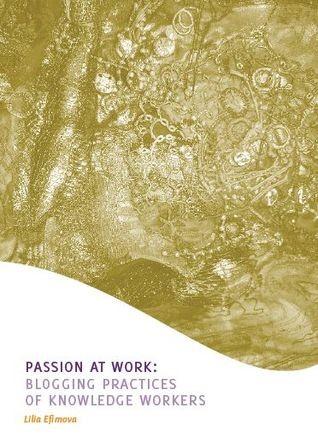Lucidea’s Lens: Knowledge Management Thought Leaders Part 20 – Lilia Efimova

Stan Garfield

Lilia Efimova works at the intersection of social media, the changing workplace, knowledge, and learning. She is passionate about technology and understanding how people work. Lilia is Russian, lives in the Netherlands, and likes the “between two countries” dimension of her life for the rich perspective it provides.
Lilia has been blogging since 2002 on finding flow, growing ideas, crossing boundaries, creating spaces, and the bigger picture behind all that. She excels at asking questions, recognizing patterns, initiating change, facilitating learning, spanning boundaries, and translating between research and practice. Her specialties include the social web, collaborative technologies, communities of practice, research, knowledge mapping, information management, workshop facilitation, change management, and expertise location. She describes herself as an unschooling facilitator – facilitating learning outside of educational organizations.
Profiles
Book
Passion At Work: Blogging Practices of Knowledge Workers

Other Content
- Blog
- PhD Research
- ResearchGate
- ACM
- Publications
- SlideShare
- Getting value from employee weblogs: a knowledge management approach
On learning myths and learning styles
Several publications came to my attention recently which focus on debunking “myths” in instructional design. Usually, I have mixed feelings about those – a lot of it makes sense, but at a deeper level, I have a feeling that it is often about replacing one research-based myth with an updated one. All of that is pretty much in the same domain of complicated, where experts know the answers and your choice is limited to which expert do you believe the most.
For example, a take on learning styles, Stop “Fixing” Your Brain by Believing in Learning Styles, which shows how different assumptions about sensory learning styles could be detrimental to learning. The post then goes on to point that those “predefined” learning styles are fluid and could be changed with time via neuroplasticity:
The study of neuroplasticity tells us that through challenging experiences, we can biologically change our brain. When we think about what this means for learning and our current learning habits, if you only have experience using certain strategies for learning (e.g., note-copying, highlighting, flashcards), then your brain’s neural pathway is stronger for those strategies. However, neuroplasticity suggests that with practice, you can develop other strategies that would help you learn in any environment.
Facilitating learning of three very different kids I see the truth behind both, “factory settings” that lead to the development of certain sensory preferences in learning and neuroplasticity. The question is at what costs “being able to learn in any environment” comes and if it is worth it. The answer to this question is different depending on the context.
In school settings, when you need a program to help many different kids to reach particular goals, it is logical to design for neuroplasticity. It should give good results “on average” by engaging different existing learning strategies and stretching into developing new ones.
From the perspective of an individual learner, it is different. Personally, I do not see the point of turning everyone into a well-rounded person able to learn in any environment. I see a lot of value in strengths-based development and being able to choose and shape your own environment in a way where your strengths could help to deal with the challenges. This is where paying attention to personal patterns in learning makes a difference (reading-related example and another one for a contrast).
As a researcher living in a fast-changing world I am also very much aware of the limits of any research in predicting what methods and techniques (±directions of pushing neuroplasticity with instructional design) would benefit learners in the long term. And all that without touching on bias coming from studying WEIRD (Western, Educated, Industrialized, Rich, and Democratic) societies and epistemological beliefs behind one’s research.

Stan Garfield
Please enjoy Stan’s blog posts offering advice and insights drawn from many years as a KM practitioner. You may also want to download a free copy of his book, Lucidea’s Lens: Special Librarians & Information Specialists; The Five Cs of KM from Lucidea Press, and its precursor, Proven Practices for Implementing a Knowledge Management Program. And learn about Lucidea’s Presto, SydneyEnterprise, and GeniePlus software with unrivaled KM capabilities that enable successful knowledge curation and sharing.
Never miss another post. Subscribe today!
Similar Posts
Lucidea’s Lens: Knowledge Management Thought Leaders Part 79 – David Garvin
KM expert David Garvin was a proponent of organizational learning to counter unpredictability in market forces and technology advances.
Lucidea’s Lens: Knowledge Management Thought Leaders Part 78 – Carl Frappaolo
KM expert Carl Frappaolo was the creator of Delphi’s Knowledge Management Methodology (KM2)
Lucidea’s Lens: Knowledge Management Thought Leaders Part 77 – Leif Edvinsson
Leif Edvinsson, Professor Emeritus at Lund University in Sweden, specializes in Intellectual Capital Management of Enterprises, Cities, and Nations
Lucidea’s Lens: Knowledge Management Thought Leaders Part 76 – Seth Earley
Seth Earley works in cognitive computing, knowledge engineering, data management systems, taxonomy, ontology, and metadata governance strategies.

Leave a Comment
Comments are reviewed and must adhere to our comments policy.
0 Comments